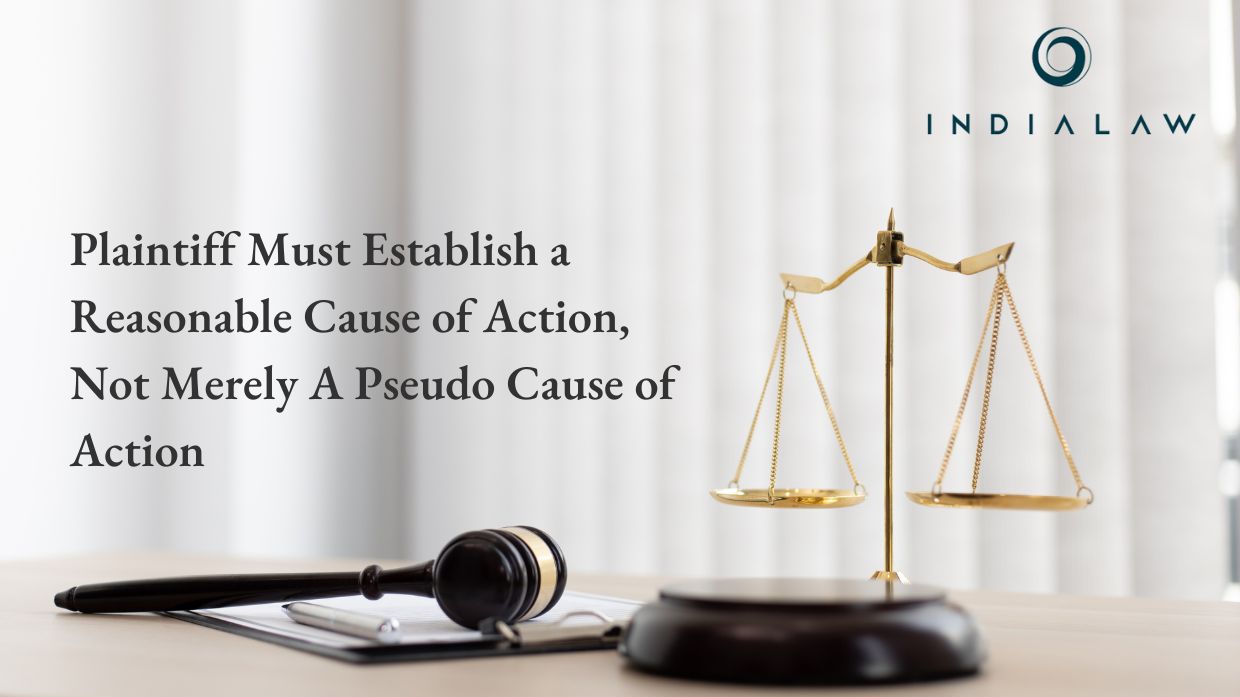Plaintiff Must Establish a Reasonable Cause of Action, Not Merely A Pseudo Cause of Action

The Hon’ble Telangana High Court (“HC”) while dismissing an application under Order VII Rule 11 of the Code of Civil Procedure, 1908, (“CPC”) emphasized that a Plaintiff must demonstrate a legitimate right to sue, rather than merely offering a superficial or illusory claim of cause of action (Bajranglal Agarwal v. Smt. Susheela Agarwal and Ors, CCCA.No.62 of 2024.)
Table of Contents
Facts of the Case:
The Appeal stems from an order dated 31st January 2024, issued by the Ld. XI Additional Chief Judge, City Civil Court, Hyderabad, concerning an application filed by the Defendants under Order VII Rule 11 of the CPC seeking rejection of the Appellant’s plaint.
The Appellant/Plaintiff had initiated a Suit seeking partition of the property specified in the suit schedule, requesting 1/3rd share for himself and the declaration of a Gift Settlement Deed on 9th December 2022, executed by Respondent No.1/Defendant No.1 in favor of Respondent No.2/Defendant No.2 as null and void. The Appealed order allowed the Defendants’ application under Order VII Rule 11 CPC, resulting in the rejection of the Appellant’s plaint.
The Respondent No.1/mother executed a Will Deed on 16th August, 2022, which she subsequently revoked on 9th December, 2022. On the same day, Respondent No.1 executed a registered Gift Settlement Deed in favor of Respondent No.2. In December 2022, the Appellant sought a partition of the suit schedule property from the Respondents, which was denied.
Thereafter, the Respondents filed an application under Order VII Rule 11 of the CPC for rejection of the Plaint. The Trial Court allowed the Respondents’ application to reject the Plaint, primarily because the Appellant failed to provide essential facts about the suit schedule property and had conceded that Respondent No.1/mother was the owner. Additionally, the Hon’ble Court determined that the Plaint did not present a valid cause of action and was legally barred.
The Plaintiff claimed in the Plaint that the cause of action arose on 16th August 2022, with the execution of the Will Deed by Defendant No.1, continued on 9th December 2022, when Defendant No.1 canceled the Will Deed and executed a Gift Settlement Deed in favor of Defendant No.2 and further arose in December 2022 when the Plaintiff requested a partition of the suit schedule property, which was subsequently refused by the Defendants.
Analysis by the Hon’ble Court:
The HC dwelled into discrepancies of the Plaint and the claims sought by the Plaintiff. The HC was of the opinion that:
- The Appellant did not seek to declare the suit schedule property as Joint Family Property eligible for partition, even though he was aware of the Will Deed dated 16th August 2022, its cancellation on 9th December 2022, and the Gift Settlement Deed executed on that same date;
- The Appellant has filed a suit solely for partition, seeking to divide the property into three shares rather than four, thereby excluding one of the three Respondents from the division;
- The Appellant has requested only the cancellation of the Gift Settlement Deed dated 9th December 2022, without addressing the cancellation of the Deed that annulled the Will Deed. As a result, this would effectively reinstate the Deed that canceled the Will Deed, which was also executed on 9th December 2022.
Therefore, from the above it is clear that the appellant, as the plaintiff, has acknowledged the absolute right of the respondent No.1/mother over the suit schedule property.
The contradictory statements in the Plaint undermine the foundation of the Appellant’s case. This is not simply a matter of inconsistent claims but involves the Appellant presenting mutually destructive causes of action. Specifically, once the Appellant acknowledges that the suit schedule property is the self-acquired property of Respondent No.1 and that Respondent No.1 has absolute ownership, the Appellant cannot later claim that the same property should be considered Joint Family Property eligible for partition.
Ruling:
The phrase ‘Cause of Action’ refers to all the facts that a Plaintiff needs to prove in order to win the case. It includes all the essential details that support the Plaintiff’s claim for relief. To determine the cause of action, one must consider the entire Plaint and accept its statements as true. In other words, the Plaintiff must base their case on the facts stated in the Plaint, and the relief they are asking for must be directly related to those facts.
Relying upon the judgments (Swamy Atmananda Vs. Sri Ramakrishan Tapovanam, (2005) 10 SCC 51), the HC held that a cause of action must involve some action or conduct by the defendant that prompts the Plaintiff to file a suit and refused to interfere with the trail Courts order. It includes all the essential facts that form the basis of the Plaintiff’s claim. The Plaint must clearly establish a right to sue, showing a direct entitlement to relief based on its statements. Order VII Rule 11 of the CPC can be invoked when a Plaint is evidently vexatious and lacks merit, failing to disclose a clear right to sue (T.Arivandandam Vs. T.V. Satyapal ,(1977) 4 SCC 467).
Conclusion:
The sole requirement for dismissing a Suit under Oder VII Rule 11 is to determine that the plaintiff has submitted a meritless suit through a Plaint that does not reveal a valid cause of action. Therefore, the appellant’s argument that the cause of action stated in the Plaint should be evaluated during the trial contradicts both the CPC and established case law. Order VII Rule 11 presumes dismissal of a Suit on rejection of the plaint without the rigour of trial.
In the authors’ opinion the Telangana High Court’s ruling emphasizes that a Plaint must clearly establish a legitimate right to sue and present a coherent cause of action. The HC upheld the rejection of the Appellant’s plaint under Order VII Rule 11 of the CPC due to its contradictions and failure to substantiate a valid claim. This decision reinforces the importance of a well-founded cause of action and the role of Order VII Rule 11 in filtering out baseless claims before trial.
By entering the email address you agree to our Privacy Policy.



